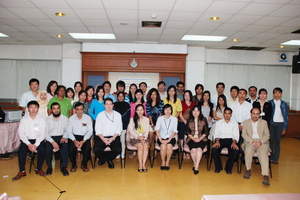International Training Course on Principles of Toxicology, Toxicity Testing and Safety Evaluation
Course Description
The course provides the student with a background of major groups of toxic substances encountered by man and animals through the food and environment, and also through exposure at the workplace. These toxicants include mycotoxins, naturally occurring toxins, N-nitroso compounds, solvents, plastics, pesticides, pollutants and radiation (UV, electromagnetic, ionizing). The course focuses on the chemistry, fate and distribution in the environment, mechanisms of their actions, toxic manifestation in living organisms as well as toxic syndrome in human beings.
Course Coordinator:
Khunying Mathuros Ruchirawat (Ph.D.)
Date:
6 January - 6 February 2009
Place:
Room 606, 6th Floor, Service Building, Chulabhorn Research Institute
Summary
The International Training Course on Principles of Toxicology, Toxicity Testing was held from 6 January – 6 February 2009. The objective of this course is to provide basic knowledge in principles of toxicology required for management of chemicals and protection of health and to update trainees on current developments in toxicology. This course content covers the fundamentals and principles of toxicology and their applications in evaluating the safety of chemicals. These include dose-response relationships; types of harmful effects; mechanisms involved in chemical actions from the entrance of chemicals into the body until excretion; toxic kinetics; activation and detoxification mechanisms; biologic and chemical factors that influence toxicity; mechanisms of carcinogenesis and mutagenesis, target organ toxicology; toxicity testing and safety evaluation. The faculty comprised 8 lecturers from Chulabhorn Research Institute, Mahidol University, and Ministry of Public Health. There were 13 participants from 11 countries, namely Bangladesh, Indonesia, Jordan, Lao, Mongolia, Myanmar, Nepal, Pakistan, Sri-Lanka, Thailand, and Vietnam supported by fellowships from TICA as well as 13 postgraduate students from the Chulabhorn Graduate Institute, 5 from Mahidol University, and 4 from the Interuniversity program. The course evaluation submitted by the participants indicated a high level of satisfaction with the content, the teaching, and the general organization of the course.

|

|

|

|

|

|

|

|

|

|
